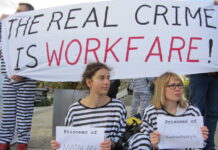The Centre for Social Justice (CSJ) report ‘The Case for a Skills Tax Break‘ says that firms should be given a tax break of 40 per cent of the cost of taking on a NEET – so offsetting rises in other taxes.
The benefits could be startling – a gain to the Treasury of up to £23.1 billion over 5 years through welfare savings and additional personal taxes paid by the young person moving into a full-time job.
The scheme could also drastically reduce the number of young people without a job.
The CSJ report says: “We have assumed employment rates of 72 per cent full time and 28 per cent part time in line with ONS survey estimates and with paid employees on salaries of £25,400 and £9,100 respectively from the same survey… The tax break set at 40 per cent (to account for two days: a day’s formal training a week and a second day to account for a less productive employee) we calculate:
“The initial average basis cost to the Government’s Exchequer in taxes foregone would be £10,166 for a full-time employee and £3,651 for a part-time one. These are annualised values.
“But after five years of employment the average employee would have added a net contribution to the Exchequer of £59,500 in additional personal taxes and reduction on the welfare bill. The benefits used are Universal Credit allowance and housing element in a middle England location tapered for earnings.
“If we were able to reduce the number of NEETS by 52 per cent… this would represent a total 5-year gain to the Exchequer of £23.1 billion across all those NEETs going into full- and part-time paid employment. Around 75 percent of this is made up of social security savings.”
The latest official figures show almost one million young people, 946,000, are not in employment, work or training. This is more than one in seven young people in the UK.
The report is calling for this rethink because the apprenticeship levy “not yet living up to its hoped for impact” and the “need to further stimulate employment growth”.
To avoid any abuse, the CSJ suggest several practical measures to ensure the scheme would work as intended:
- The tax break would only be paid while the apprentice is still employed and in training. There is then an incentive for the employer to keep them after that.
- Beneficiaries would need to be a UK passport holder and/or pass a habitual residency test in order to stop abuse of the system.
Ed Davies, Policy Director at the CSJ, said:
“The Government needs to get serious about tackling the employment crisis among our young people.
“It is intolerable to carry on pretending that there isn’t a problem or that we can do nothing about it. That we should just continue to pay for spiralling welfare costs.
“There is an alternative. Offering a true, and much needed, incentive to businesses to hire young Brits could deliver for young people, the businesses that hire them and for the wider British economy.”
Please see further information about the Nieper Employability Benchmarks here.
Notes to editors:
MEDIA CONTACT
Matt Walsh
07754 786789
matthew@mippr.co.uk
About the Centre for Social Justice:
Established in 2004, the Centre for Social Justice (CSJ) is an independent think tank that studies the root causes of Britain’s social problems and addresses them by recommending practical, workable policy interventions. The CSJ’s vision is to give people in the UK who are experiencing multiple disadvantage and injustice every possible opportunity to reach their full potential.
The majority of the CSJ’s work is organised around five “pathways to poverty”, first identified in our ground-breaking 2007 report Breakthrough Britain. These are: educational failure; family breakdown; economic dependency and worklessness; addiction to drugs and alcohol; and severe personal debt.
Since its inception, the CSJ has changed the landscape of our political discourse by putting social justice at the heart of British politics. This has led to a transformation in Government thinking and policy. For instance, in March 2013, the CSJ report It Happens Here shone a light on the horrific reality of human trafficking and modern slavery in the UK. As a direct result, the Government passed the Modern Slavery Act 2015, one of the first pieces of legislation in the world to address slavery and trafficking in the 21st century. Other CSJ policy initiatives include Universal Credit, Universal Support, and the Into Work Guarantee; Family Hubs; Housing First; Severe Absence from School; and Prisoner Work Placements.
Our research is informed by experts including prominent academics, practitioners, and policymakers. We also draw upon our CSJ Alliance, a unique group of frontline charities, social enterprises, and other grassroots organisations. These are curated by our CSJ Foundation and have a proven track-record of reversing social breakdown in some of the UK’s most challenging communities, far beyond Westminster.
The social issues facing Britain are chronic. In 2025 and beyond, we will continue to advance the cause of social justice and connect the back streets of Britain with the corridors of power, so that more people can continue to fulfil their potential.

| [donate]
| Help keep news FREE for our readersSupporting your local community newspaper/online news outlet is crucial now more than ever. If you believe in independent journalism,then consider making a valuable contribution by making a one-time or monthly donation. We operate in rural areas where providing unbiased news can be challenging. |

















